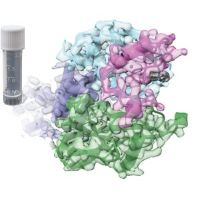Specification
| Description | Recombinant protein from the full-length sequence of homo sapiens kallikrein related peptidase 6 (KLK6), transcript variant C (NM_001012965). |
| Organism | Homo sapiens (Human) |
| Expression Host | Human Cells |
| Tag Info | His or DYKDDDDK. Please contact us if you need further information or require specific designed tag. |
| Purity | Greater than 90% by SDS-PAGE gel |
| Uniprot ID | Q92876 |
| Entry Name | KLK6_HUMAN |
| Gene Names | KLK6 PRSS18 PRSS9 |
| Alternative Gene Names | PRSS18 PRSS9 |
| Alternative Protein Names | Kallikrein-6 (EC 3.4.21.-) (Neurosin) (Protease M) (SP59) (Serine protease 18) (Serine protease 9) (Zyme) |
| Application | Antigens, Western, ELISA and other in vitro binding or in vivo functional assays, and protein-protein interaction studies; For research & development use only! |
| Buffer | Purified protein formulated in a sterile solution of PBS buffer, pH7.2, without any preservatives |
| Endotoxin | Endotoxin level is < 0.1 ng/µg of protein (<1EU /µg) |
| Length | 244 |
| Molecular Weight(Da) | 26856 |
| Protein Sequence | (The sequence of expressed protein may have some variation from the sequence shown below. Please contact us for the exact sequence.) MKKLMVVLSLIAAAWAEEQNKLVHGGPCDKTSHPYQAALYTSGHLLCGGVLIHPLWVLTAAHCKKPNLQVFLGKHNLRQRESSQEQSSVVRAVIHPDYDAASHDQDIMLLRLARPAKLSELIQPLPLERDCSANTTSCHILGWGKTADGDFPDTIQCAYIHLVSREECEHAYPGQITQNMLCAGDEKYGKDSCQGDSGGPLVCGDHLRGLVSWGNIPCGSKEKPGVYTNVCRYTNWIQKTIQAK |
Background
| Function | FUNCTION: Serine protease which exhibits a preference for Arg over Lys in the substrate P1 position and for Ser or Pro in the P2 position. Shows activity against amyloid precursor protein, myelin basic protein, gelatin, casein and extracellular matrix proteins such as fibronectin, laminin, vitronectin and collagen. Degrades alpha-synuclein and prevents its polymerization, indicating that it may be involved in the pathogenesis of Parkinson disease and other synucleinopathies. May be involved in regulation of axon outgrowth following spinal cord injury. Tumor cells treated with a neutralizing KLK6 antibody migrate less than control cells, suggesting a role in invasion and metastasis. {ECO:0000269|PubMed:11983703, ECO:0000269|PubMed:12878203, ECO:0000269|PubMed:12928483, ECO:0000269|PubMed:15557757, ECO:0000269|PubMed:16321973, ECO:0000269|PubMed:16987227}. |
| Pathway | |
| Protein Families | Peptidase S1 family, Kallikrein subfamily |
| Tissue Specificity | In fluids, highest levels found in milk of lactating women followed by cerebrospinal fluid, nipple aspirate fluid and breast cyst fluid. Also found in serum, seminal plasma and some amniotic fluids and breast tumor cytosolic extracts. Not detected in urine. At the tissue level, highest concentrations found in glandular tissues such as salivary glands followed by lung, colon, fallopian tube, placenta, breast, pituitary and kidney. Not detected in skin, spleen, bone, thyroid, heart, ureter, liver, muscle, endometrium, testis, pancreas, seminal vesicle, ovary, adrenals and prostate. In brain, detected in gray matter neurons (at protein level). Colocalizes with pathological inclusions such as Lewy bodies and glial cytoplasmic inclusions. Overexpressed in primary breast tumors but not expressed in metastatic tumors. {ECO:0000269|PubMed:10997858, ECO:0000269|PubMed:11018688, ECO:0000269|PubMed:11668196, ECO:0000269|PubMed:12928483, ECO:0000269|PubMed:16800739}. |
QC Data
| Note | Please contact us for QC Data |
| Product Image (Reference Only) |  |

